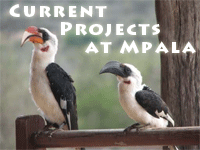Testimonials
"I've worked at several research stations in the tropics over the past few years, and Mpala just blew them all out of the water in terms of accommodations, both the staff and the researchers, the landscape and wildlife...pretty much every measure."
Anne-Maire Hodge
PhD Candidate
Dept. of Ecology
University of Wyoming
"Coming to Mpala showed me what a research center can really be when a devoted group of people put their minds together. The intellectual community here, the group meals, the luxurious accomodations, the staff that takes care of all the little things so that the researchers have time to do their work.... it's truly incredible. Being at Mpala, where there are other scientists to bounce ideas off of, staff taking care of everything, and an environment geared towards RESEARCH is incredible. Having spent the last 8 months at my site in Ethiopia, I can now truly appreciate the time and effort and money you all have put into making Mpala what it is.Thanks so much for putting together such a fabulous place to work and live, and for letting me come and experience it."
Caitlin Barale
PhD Candidate
Dept. of Ecology and Evolutionary Biology
Princeton University
"Hello Professor,
Hope you have been ok since the last time we met. I am also ok and am safely settled back home after the mind blowing experience at Mpala. this is a long overdue word of thanks for the wonderful opportunity you gave us to be part of an interesting and noble undertaking. I am so greatful to you and the rest of the organisers for a job well done. I do hope that such collaborations will continue emerging and more students on both sides of the Atlantic Ocean will continue to benefit. I am exteremly greatful for the experience and no words can articulate how I feel.
Thank you so much and i look forward to continuing this discussion when the school year begins. Have a good evening and God Bless."
Rose Muthoni
Undergraduate, Zoology
University of Nairobi
Participant in University of Michigan field course
"My research is on Elephant Distribution and its impact on the landscape. As such, Mpala Conservancy offers me an ideal study area, with its natural landscapes supporting both wildlife and livestock. Mpala Research Centre is a haven for field ecologists, affording both access to natural ecosystems and modern conveniences like internet access and laboratory facilities. Mpala also uniquely facilitates networking, with academics and wildlife practitioners always around to lend advice, as well as fellow researchers eager to share experiences and ideas. My time here has been made even more enjoyable by the staff, who always carry out their duties with a willingness to help and a friendly smile."
David W. Kimiti
MSc. Range Ecology
Dept. of Land Resource Management
University of Nairobi
"I am working with the National Zoo to study the health and physiology of kori bustards in their native habitat. Mpala is a truly exceptional place. The Research Centre has not only provided me with essential resources and facilities, but the expanse of the Mpala property and the superior quality of the local habitat have also supplied me with an excellent study site. Best of all, Mpala has allowed me to make contact and share ideas with other researchers and students. I feel fortunate to have had the opportunity to work at Mpala and hope that my path will lead me here again one day."
Rhea Hanselmann, DVM, MPVM-Candidate
Mpala/Smithsonian Institution Post-doctoral Fellow
"My research focuses on the ecology of parasites and infectious diseases in wild ungulates, and I have a long-term research project based at Mpala Research Center. My work combines field work and lab work, including parasitology, immunology, endocrinology and genetics. Mpala is a great place to work because in addition to being a great field site, the Center has facilities that allow for a variety of lab activities to go hand-in-hand with field research. For such a remote location, this feature is unparalleled."
Vanessa Ezenwa
Professor
School of Ecology & Deparment of Infectious Diseases
University of Georgia
"Many across Kenya agree that the severity of the 2009 drought stemmed from failed government policies and poor management of rangelands; others argue poor rains and climate change, or a combination of all. On Mpala we're laying the ground work to understand how to counter these challenges. Our researchers are providing insights into how we might adapt to shifting rainfall patterns, improve water retention and carbon storage across the savannas, and improve rangelands for better livestock and healthier wildlife populations. All of these insights impinge on human welfare by helping us understand how to build resilience to drought and climate change. This is especially important for our pastoral neighbours as they make their difficult transition from subsistence to more commercial husbandry."
Margaret Kinnaird, Executive Director


